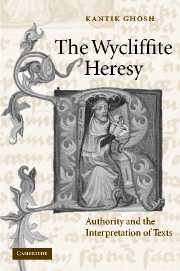Book contents
- Frontmatter
- Contents
- Acknowledgements
- List of abbreviations
- Introduction
- 1 John Wyclif and the truth of sacred scripture
- 2 William Woodford's anti-Wycliffite hermeneutics
- 3 Vernacular translations of the Bible and ‘authority’
- 4 The English Wycliffite sermons: ‘thinking in alternatives’?
- 5 Nicholas Love and the Lollards
- 6 Thomas Netter and John Wyclif: hermeneutic confrères?
- Afterword: Lollardy and late-medieval intellectuality
- Notes
- Bibliography
- Index of names and titles
- General index
- CAMBRIDGE STUDIES IN MEDIEVAL LITERATURE
1 - John Wyclif and the truth of sacred scripture
Published online by Cambridge University Press: 22 September 2009
- Frontmatter
- Contents
- Acknowledgements
- List of abbreviations
- Introduction
- 1 John Wyclif and the truth of sacred scripture
- 2 William Woodford's anti-Wycliffite hermeneutics
- 3 Vernacular translations of the Bible and ‘authority’
- 4 The English Wycliffite sermons: ‘thinking in alternatives’?
- 5 Nicholas Love and the Lollards
- 6 Thomas Netter and John Wyclif: hermeneutic confrères?
- Afterword: Lollardy and late-medieval intellectuality
- Notes
- Bibliography
- Index of names and titles
- General index
- CAMBRIDGE STUDIES IN MEDIEVAL LITERATURE
Summary
De Veritate Sacrae Scripturae constitutes Wyclif's most extended theoretical engagement with the nature of biblical meaning and the interpretative problems posed by biblical language. A part of his so-called Summa Theologiae, it forms one of the corner-stones of his increasingly radical conceptualisation of a Church guided by an ideal lex Christi abstracted from scripture. It was written around 1377–78, after the first, and cataclysmic, volume of De Civili Dominio, his revisionist tract on the nature of dominium and its dependence on grace. De Civili Dominio I resulted in Wyclif's being summoned to St Paul's in 1377 to answer charges of heresy; moreover, eighteen propositions from his book were condemned by Pope Gregory XI in a series of bulls dated 22 May 1377. William Woodford OFM wrote his Determinatio de Civili Dominio, and Nicholas Radcliffe OSB his Dialogi in refutation of Wyclif's views; a host of other monks and seculars joined in the fray. Thus beleaguered, Wyclif spent most of 1377–78 answering his critics.
De Veritate, though primarily a theoretical treatise on hermeneutics, is therefore also in the nature of a polemical tract, always aware of, and often addressing directly, the contemporary disputes. As the work progresses, its tone acquires a heightened stridency, from a more or less focussed study of scriptural signification in the first fifteen chapters, to an increasingly polemical engagement with issues of heresy, ideal priesthood, papal authority and dominion in the later sections.
- Type
- Chapter
- Information
- The Wycliffite HeresyAuthority and the Interpretation of Texts, pp. 22 - 66Publisher: Cambridge University PressPrint publication year: 2001



